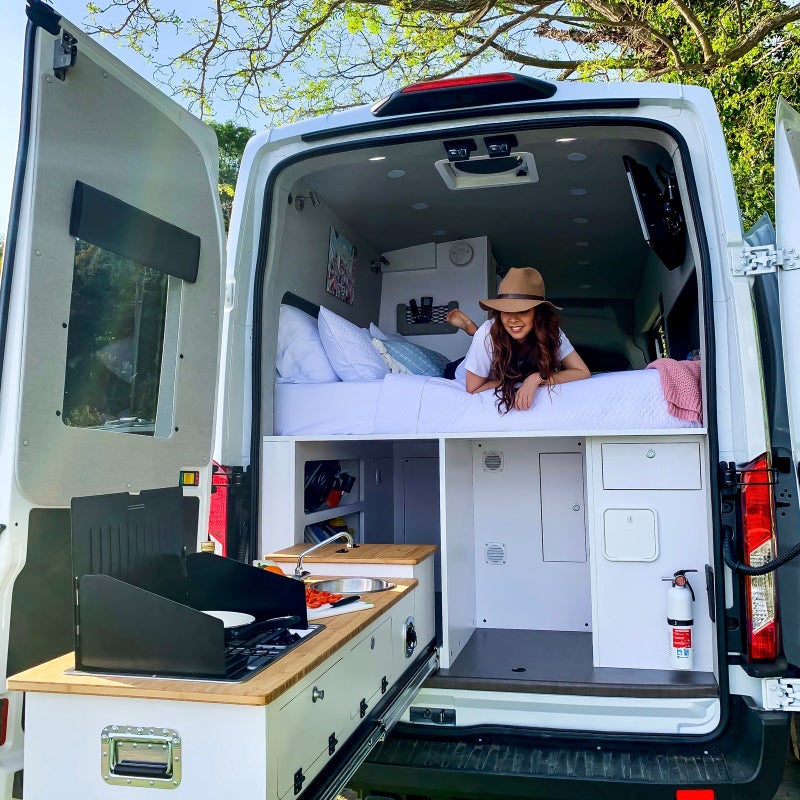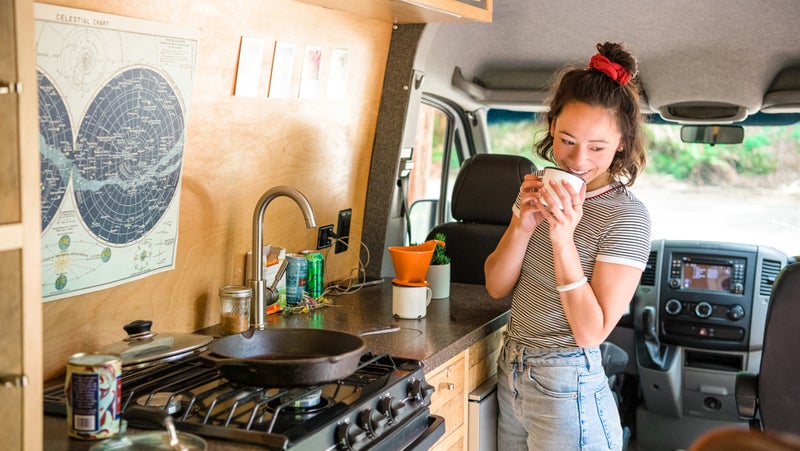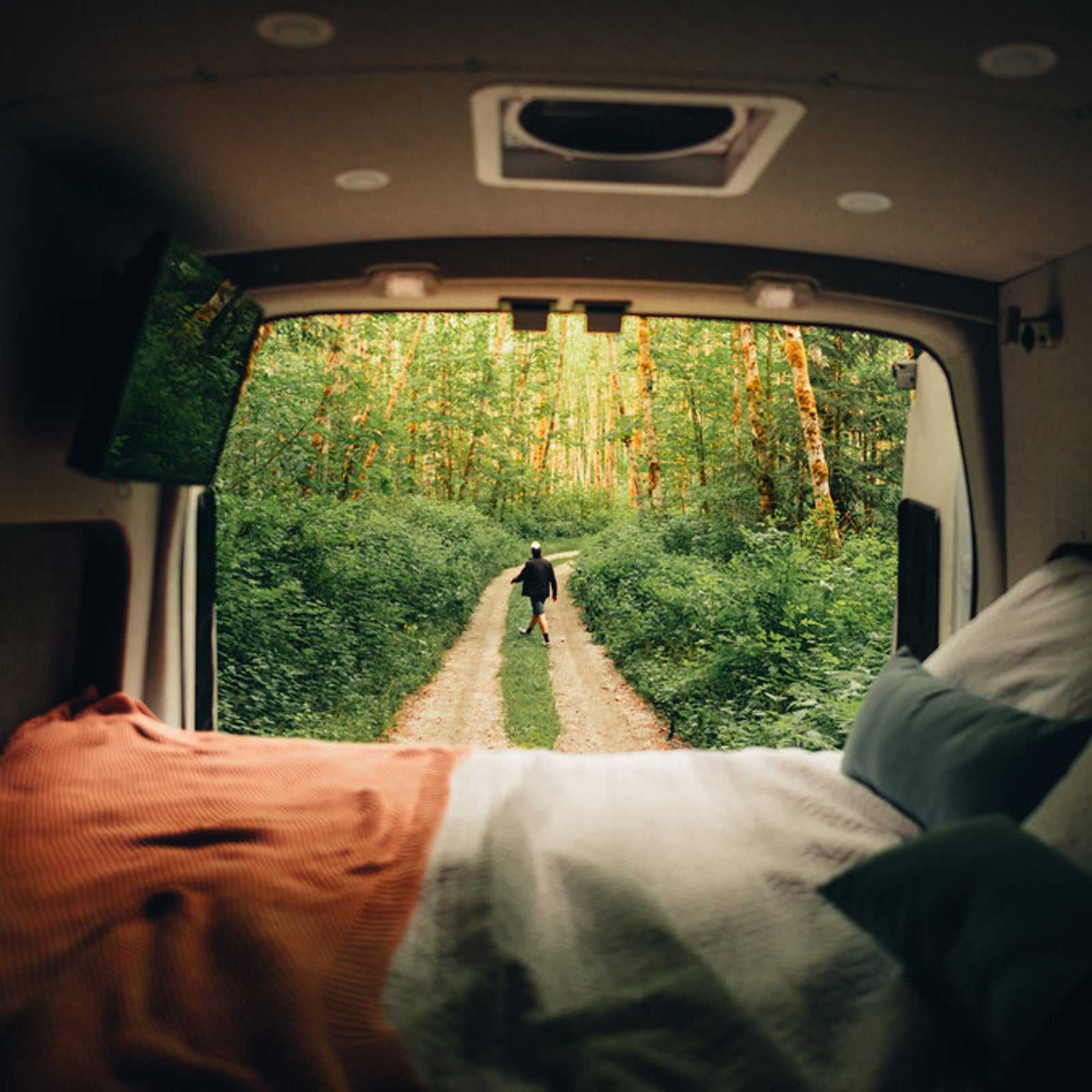In 2019, the RV Industry Association (RIVA), a trade federation, reported a 16 percent drop in wholesale RV shipments from the year before. And when COVID-19 first swept the nation in March, those sales dropped even more. But almost as fast as they fell, sales and rentals began to skyrocket. By June, RV shipments in the U.S. were the highest they’d been since 2018, reaching 40,462 units, an 11 percent increase from June 2019.
As far as pandemic-fueled buys go, it’s easy to understand why people are turning to RVs. With many concerned about the safety of hotels and other lodging, RVs offer more control and flexibility. Both existing and newly launched companies are getting creative with what this new era of road travel will look like, as people have begun embracing so-called COVID campers for long road trips in lieu of flights, turning to part- or full-time vanlife in response to companies switching to remote work, or leaving expensive real estate behind for a more budget-friendly option. Here’s how new startups are going beyond the basic RV-rental formula by being more on demand, millennial focused, and remote-work-friendly.
1. They Offer Socially Distant Vacations
Cabana, an RV startup currently serving the Seattle area that provides rental-camper vans outfitted to look like a boutique hotel on wheels, seeks to offer a more controlled environment than peer-to-peer rentals, in which guests can expect the same layout, features, and level of cleanliness every time they book. Cabana vans combine a stylish design with all the amenities you’d typically find in a home rental, from flat-screen TVs and memory-foam mattresses to full bathrooms and free Wi-Fi. What sets the company apart are contactless check-in and an on-demand concierge that makes it easy for the first-time camper to explore the outdoors.
“Prior to COVID-19, the majority of the customers were from out of town and using a Cabana van during their vacation to the Seattle area,” says Scott Kubly, the company’s founder.
According to Kubly, the pandemic completely transformed the company’s customer base. “Since the shelter-in-place orders took effect in Seattle, Cabana has seen a 400 percent increase in bookings, with the majority being local customers looking for a way to safely get out of town for a socially distanced compliant vacation.” Cabana plans to launch in six more cities next year, including in San Diego, Denver, and San Francisco.

Cabana’s change in demographics exemplifies what could be a long-term switch from long-distance air travel to domestic road travel. This was the case for Kay Kingsman, founder of the Awkward Traveller, a blog that seeks to inspire underserved and underrepresented communities to travel, who rented her first RV through Outdoorsy during the pandemic.
“My interest in RV travel increased during the pandemic, because I wanted to road-trip domestically and get into nature, but trying to map and plan out hotel stays—and sanitized hotels at that—was difficult and stressful,” she says.
Though most hotels have implemented new sanitation practices in line with CDC guidelines, hotels require significantly more sanitation than a camper van due to a greater number of contact surface areas and shared spaces, like lobbies. Cabana’s vans are cleaned using current best practices, and, according to Kubly, “irradiated with UVC light and then left to stand for six to eight hours between rentals.” Not only that, but van rentals offer more control over who you’re exposed to, says Kingsman: “I tried doing a more traditional staycation and rented a hotel room in a nearby town, but no one in the hotel was wearing a mask, including the staff. I couldn’t trust that they were actually taking sanitation seriously, so I ended up leaving,” she says. “I felt as though I had more control over sanitation in the RV since I didn’t have other hotel guests or staff to consider.”
On the other hand, Laura Edmondson, a diversity, equity, and inclusion (DEI) and sustainability consultant, podcast host, and digital creator who lives full-time in her personally customized Ford Transit Connect, has avoided traveling in the van during the pandemic because she doesn’t want “to contribute to the spread of COVID.” Instead she has opted to park at friends’ houses and boondocking sites. Despite the lack of mobility, Edmondson is grateful for the affordability and flexibility living in her van has allowed during so much uncertainty. Her relationship to vanlife, which is less about travel and more about ease and affordability, illustrates another trend coming out of the pandemic: different types of accommodation.
2. They Provide Alternative Housing
In 2019, RIVA reported that over one million people in the U.S. lived in RVs full-time. Those numbers are growing as the pandemic has given more folks a nudge toward permanent vanlife, now that many jobs have gone remote and the outdoors is more appealing than populous COVID-19 hot spots like cities. That, combined with rising housing costs, could result in RVs and camper vans becoming viable alternative forms of long-term housing.
“The vehicle is no longer just a way to move around, but it’s now a real house that clients are looking for,” says Paul Aubert, cofounder of Mybushotel, a company that converts old school buses into bus hotels, or “B-hotels,” which are design-forward RVs with custom cabinets, living rooms, kitchens, bedrooms, bathrooms, and roof terraces. Some are outfitted with solar panels, water heaters, and other gadgets that allow them to be independent of water and electricity hookups.
Before the pandemic, Mybushotel customers were primarily international tourists who rented the buses turned RVs to explore North, Central, and South America, but when rental bookings dried up with the COVID-19 travel restrictions, the company adjusted its focus completely to exclusively selling the custom conversions.
“We received more than 400 [requests] from May to August for our B-hotels. Lots of people were thinking about the possibility of changing their way of living, and COVID-19 was a good opportunity to go forward,” Aubert says.
The kitted-out buses are custom-made, so prices can vary greatly but are on the expensive end, with the average build costing between $45,000 and $80,000.
3. They’re Embracing the Shift to Remote Work
Meanwhile, the new company Kibbo, which creates RV parks geared toward working millennials, with amenities, work spaces, and community perks, will bring on its first members in September. “We have been thinking about how we can use camper vans and communal spaces to create a new model for flexible housing for a few years,” says CEO Collin O’Donnell. “With the pressure from shelter-in-place orders, the record-high rents, and the opportunity presented by the new work-from-anywhere economy, we decided that we couldn’t wait any longer and decided to launch.”

Kibbo is positioning itself as a “full-time alternative to the traditional apartment.” In addition to offering vans for rent, it’s open to members who already have their own vans. The company is hoping to attract adventurers who will actively contribute to creating a community based on shared outdoor values—something it hopes to ensure with an application process. Those accepted will pay a sign-on fee of $485 and monthly dues that vary (starting at $150), according to how often members want access to a clubhouse. It also plans to offer single-use passes for overnight access to nonmembers.
Starting as early as September, members can access community clubhouses out west in Ojai, California, Nevada’s Black Rock Desert, near Zion National Park in Utah, and, as of press time, Big Sur, pending the spread of the wildfires. In 2021, Kibbo plans to open clubhouses in San Francisco and Los Angeles and eventually expects to go national.
Where decades-old RV companies have long focused on comfort features for retired or affluent customers, RV startups like Cabana, Kibbo, and Mybushotel see the future of RVs centered around digital nomads in need of remote working capabilities. “Our clients are looking for a new product that allows them to travel and work in the best conditions. They need to have internet access, a possibility to work in their vehicle, and a good-size vehicle to travel in,” Mybushotel’s Aubert says.
Kibbo’s O’Donnell says, “Right now over 60 percent of Americans are working from home. We are asking: Why not work from anywhere? Why are you paying rent in a city or suburb close to your work when you no longer need to commute? We offer the flexibility to live and work from wherever you want, in nature or in the city, changing locations whenever you want, but at the same time being part of an intentional community.”
The vision to create a long-term RV community is one that O’Donnell hopes will last well after the pandemic is over. Until then, Kibbo will follow CDC guidelines and include those recommendations in its code of conduct for members. “Inherently, we are offering people more choice, so they can be together when it makes sense and is safe to do so or be on their own when they want,” he says.
4. They’re Becoming More Accessible
In addition to travelers looking for socially distant vacations, and a new sector of remote workers drawn to full-time vanlife, there’s a third group interested in RVs for another reason: affordability. Sites like Outdoorsy have made RV rentals more reasonable since the start of the pandemic. With rates as low as $50 a night, people of different income levels now have more access to them.
Natasha Van Horne of @TashofAllTrades, who is an EMT, a full-time vanlifer since July, and mother to a five-year-old, sees camper vans as a means to travel continuously on a budget.
“The cost of living 20 years ago is astronomically different from today,” she says. “Alternative living, in my case vanlife, is a financial breath of fresh air. It provides the ability to pay off debts, save money for a future home, and create beautiful memories along the way.”
The single mom travels the country with her daughter, who she homeschools. While the van satisfies Van Horne’s dream of traveling full-time, it gives her family something even better: “I breathe easier knowing that I can save money for my daughter’s college education, while still putting money away.”
Kingsman, the blogger, thinks the increased accessibility to a wider range of social classes may be one of the reasons RV experiences are appealing to more solo women, families, and people of color.
“My image of people who travel in RVs and camper vans was mainly older, wealthier, white couples,” says Kingsman. “Even when hiking and camping, which usually have a younger demographic, I was often the only Black woman in the area. Recently, I’ve noticed a huge surge of diversity in the RV and camper community.”
Kibbo is aware of the outdoor industry’s push for diversity, and it’s hoping to be a safe community for groups who may have historically been excluded from outdoor recreation. This includes developing a holistic strategy with advisers and board members to include people of diverse backgrounds as well as speaking with potential customers about challenges they may face on the road so that the company can adjust accordingly during the initial launch phase. “We are open to everyone and are intentionally trying to foster a diverse community and actively invite people from all walks of life to participate, particularly people of color, women, and the LGBTQ community,” O’Donnell says.
Cabana, Kibbo, and Mybushotel’s adaptability could pay off immensely, especially if they continue to focus on catering to new RV enthusiasts. From providing a safe travel experience to remote-friendly housing, these companies illustrate a larger, more permanent shift toward mobile living.
“COVID showed us that cities can change overnight, but this isn’t just about the pandemic,” says O’Donnell. “When everything is changing—consumer trends, economic opportunity, climate, health situations—you need services that are adaptable and responsive.”


